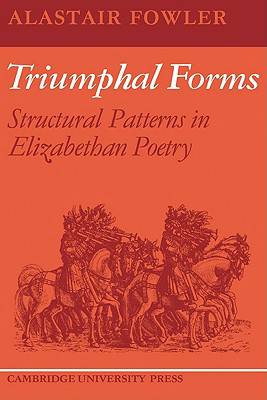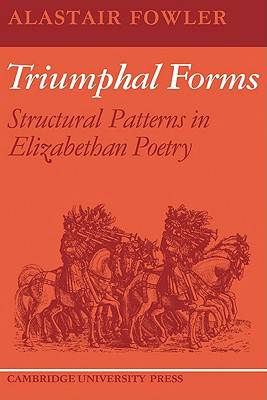
- Afhalen na 1 uur in een winkel met voorraad
- Gratis thuislevering in België vanaf € 30
- Ruim aanbod met 7 miljoen producten
- Afhalen na 1 uur in een winkel met voorraad
- Gratis thuislevering in België vanaf € 30
- Ruim aanbod met 7 miljoen producten
Zoeken
Triumphal Forms
Structural Patterns in Elizabethan Poetry
Alastair Fowler, Fowler Alastair
Paperback | Engels
€ 72,45
+ 144 punten
Omschrijving
A study of numerology in Elizabethan poetry, with some background studies which base the subject in classical learning, the works of Dante and Petrarch, and the esoteric traditions of the humanists. The central assumption of numerological criticism is that there exist works written in this tradition which show a correspondence between structure and meaning on a numerical plane; that is, one in which the number of the constituent parts (lines, stanzas, sonnets in a sequence) expresses a major aspect of the meaning. For instance parts of the whole can be arranged to represent months of the year and so on. Such structures of time and the triumphal form, in which the most important 'sovereign' element is placed at the centre, are the two main numerological patterns discussed by Dr Fowler. Critics have tended to regard numerology as an isolated phenomenon, rare after the Middle Ages but Dr Fowler demonstrates its persistence in the works of Spenser, Sidney, Chapman, Shakespeare, Donne, Jonson, Dryden and others.
Specificaties
Betrokkenen
- Auteur(s):
- Uitgeverij:
Inhoud
- Aantal bladzijden:
- 264
- Taal:
- Engels
Eigenschappen
- Productcode (EAN):
- 9780521128964
- Verschijningsdatum:
- 4/02/2010
- Uitvoering:
- Paperback
- Formaat:
- Trade paperback (VS)
- Afmetingen:
- 152 mm x 229 mm
- Gewicht:
- 390 g

Alleen bij Standaard Boekhandel
+ 144 punten op je klantenkaart van Standaard Boekhandel
Beoordelingen
We publiceren alleen reviews die voldoen aan de voorwaarden voor reviews. Bekijk onze voorwaarden voor reviews.











